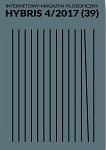WHO AM I? TAYLOR’S SELFHOOD AND THE TRANSCENDENTAL CONDITION OF CONVERSATION
WHO AM I? TAYLOR’S SELFHOOD AND THE TRANSCENDENTAL CONDITION OF CONVERSATION
Author(s): Klementyna ChrzanowskaSubject(s): Studies of Literature, Philosophy of Language, Philosophy of History
Published by: Wydawnictwo Uniwersytetu Łódzkiego
Keywords: Charles Taylor; identity; selfhood; speech; language; language theory; human agency; Cavell; Wittgenstein;
Summary/Abstract: Through a close reading of a small section of Sources of the Self: The Making of the Modern Identity, this paper aims to highlight what is, in the author’s view, a particularly significant aspect of Charles Taylor’s conception of the constitution of selfhood. Namely, its entanglement in speech. “We don’t have selves in the way we have hearts and livers”, Taylor argues. We ‘have selves’ through the constant effort of articulation, which we are only capable of because we learned it from and with others in what Taylor calls the original situation of conversation. If the human ability to speak is the underlying feature behind self-interpretation, morality, and community – all important components of identity in Taylor’s view – then the very way we ‘have language’ will strongly impact the way we ‘have selves’. Language theory must thus become an important element of considerations on human identity and selfhood.
Journal: Internetowy Magazyn Filozoficzny HYBRIS
- Issue Year: 2017
- Issue No: 39
- Page Range: 1-18
- Page Count: 18
- Language: English

